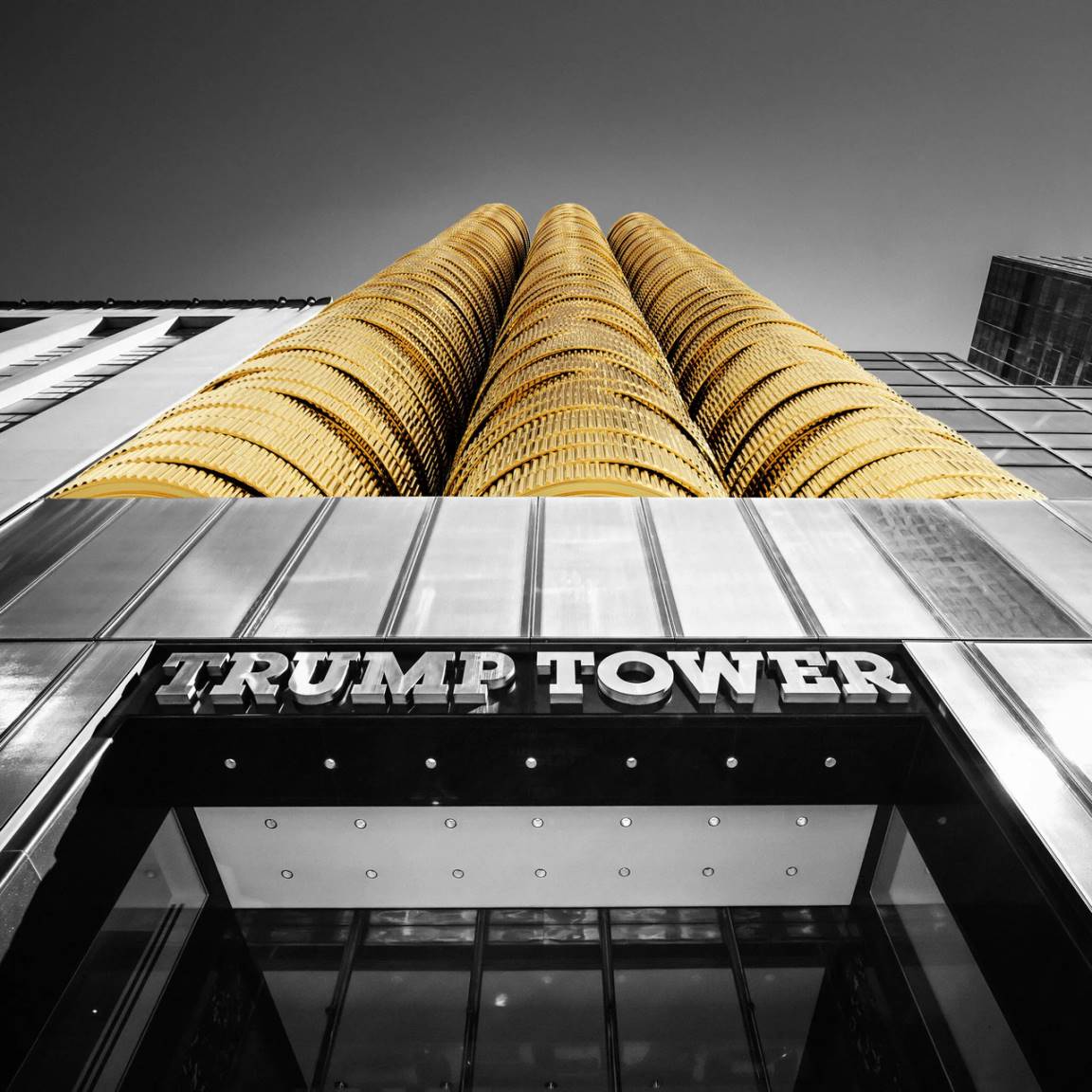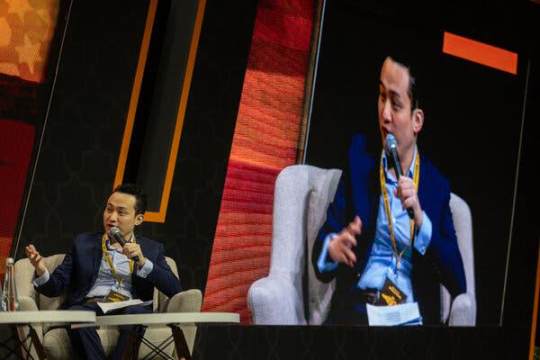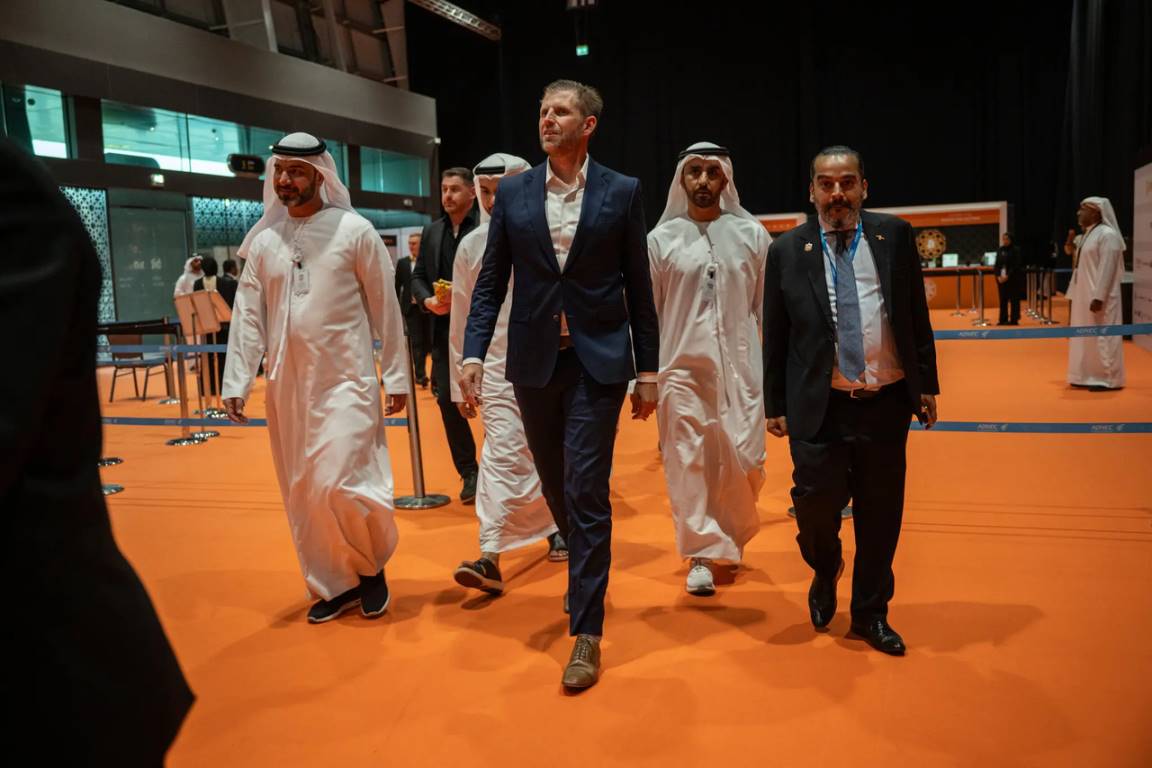A few days before President Trump’s inauguration, a promotion for “ZMoney” appeared on the encrypted messaging app Signal.
“ZMoney” refers to Zachary Folkman, an entrepreneur who previously ran a dating app company called Date Hotter Girls and currently serves as a representative for WLFI. Zachary Folkman was writing to a cryptocurrency startup in the Cayman Islands proposing a “partnership” in which both parties would buy each other’s digital currency, a deal that would boost the startup’s public profile.
But The New York Times discovered that there was a hidden clause. For the privilege of working with the Trump family, the startup actually had to secretly pay WLFI millions of dollars.
Zachary Folkman wrote: "We get a ton of exposure and credibility for everything we do," and claimed that other business partners have pledged donations of $10 million to $30 million to WLFI.
WLFI executives said the Cayman Islands startup rejected the proposal, as did several other companies that received similar offers from WLFI. They considered the deal unethical and argued that WLFI was essentially selling traffic generated by its political endorsements and hiding this from the public.
WLFI executives, who insisted they had done nothing wrong, were not deterred from their actions. They successfully marketed similar deals to other companies and WLFI tokens to buyers around the world, ultimately raking in more than $550 million in sales, with a large portion of the proceeds distributed to the president’s family.
Trump’s return to the White House has opened up new ways for him to profit from his power, whether through his social media companies or new overseas real estate deals. But none of the Trump family’s other business activities have posed a greater conflict of interest than the series of related transactions that resulted from the creation of WLFI.
WLFI, which is primarily owned by Trump family business entities, has shattered centuries of social norms regarding the presidency, dissolving the boundaries between private business and government policy in a way unprecedented in modern American history.
Trump is now not only a major cryptocurrency trader but also the industry’s top policymaker. So far in his second term, Trump has used his presidential power to benefit the industry. While he has derided cryptocurrencies for years as a haven for drug dealers and scammers, he has consistently allowed his companies to make money through cryptocurrencies.
The Trump administration has included sympathizers for the cause, including the appointment of a cryptocurrency industry adviser as chairman of the Securities and Exchange Commission (SEC), and the Justice Department recently disbanded a cryptocurrency crime task force, continuing a general easing of Biden-era scrutiny of the industry.
The New York Times’ investigation into WLFI’s rapid rise from startup to international force, and Trump’s transformation from cryptocurrency skeptic to industry staunch supporter, highlighted a host of conflicts of interest at the company:
- WLFI directly benefited from actions by the Trump administration, such as his announcement of a federal cryptocurrency reserve that would include digital currencies that WLFI invested in. The president’s announcement led to a temporary increase in the value of assets held by WLFI.
- WLFI has sold its cryptocurrency to overseas investors, including in Israel and Hong Kong, according to interviews and data obtained by The New York Times, opening a new way for foreign companies to curry favor with Trump.
- Several investors in WLFI’s cryptocurrency management company have been accused of wrongdoing by the federal government. They include an executive whose alleged fraud case was suspended after he invested millions of dollars in WLFI. Other investors and business partners are seeking to expand their businesses, which would require approval from the Trump administration.
- WLFI proposed cryptocurrency deals with at least five startups, often soliciting large sums of money in Trump’s name. The deals raised alarm bells among senior executives.
“It’s a stain on our industry,” said Andre Cronje, founder of Sonic Labs. “Anyone who accepts this project obviously thinks they’re going to make money because it’s an official Trump-endorsed project.”
WLFI spokesman David Wachsman denied that any of the firm’s transactions constituted “unilateral payments for services.” But he acknowledged that the firm did engage in “co-investment transactions” and said those transactions resulted in “thoughtful, strategic exchanges between the parties that were mutually beneficial.”
David Wachsman also said that it is "false, ridiculous and dangerous" to think that investing or working with WLFI is some kind of political exchange. He said, "No investor or partner has ever asked for any political favoritism, and we would never consider such a possibility."
Still, the deal WLFI struck benefits the president and his family: A Trump business entity owns 60% of WLFI and is entitled to 75% of some of the proceeds from the token sale, which can be converted into cash, according to WLFI’s website.
“It’s one of the most successful things we’ve ever done,” Eric Frederick Trump, the president’s son who oversees the family business, said in an interview this month at Trump Doral Golf Links in Florida.
He and his brother, Donald John Trump, are actively involved in WLFI, although they rely on three partners to oversee the project's day-to-day operations. Two of them, Zachary Folkman and Chase Herro, have mixed records in the cryptocurrency space. The other is Zach Witkoff, the son of Steve Witkoff, the U.S. envoy to the Middle East on Trump's team, and one of the founders of WLFI.
In recent days, Zach Witkoff, Zachary Folkman and Chase Herro met with Prime Minister Muhammad Shehbaz Sharif and other senior government officials in Pakistan to discuss the WLFI project. The trip was complete with limousines, dancing and police escorts, seamlessly blending the president's business interests with the formality of a state visit.
President Trump has pointed out that conflict of interest laws do not apply to him and that he enjoys broad immunity for official actions taken as president.
A spokesman for President Trump noted in a statement that his "assets are managed by trusts administered by his children," so there is "no conflict of interest."
WLFI supporters are not concerned about the conflict. “Trump wants to make a lot of money in crypto,” Konstantin Kuznetsov, a Russian citizen living in Miami, said in an interview. His company, based in Gibraltar, bought $1 million worth of World Liberty cryptocurrency. “We can join this wave.”

Leading Cryptocurrency Advocate
A businessman who made his name in real estate, Trump never aspired to build a digital currency empire. In fact, at the end of his first term, Trump expressed his disdain for cryptocurrencies via social media. They are "not money," he warned. Their "value is extremely volatile and has no basis." By last year, his views began to change.
After the attack on the Capitol on January 6, 2021, which expelled the family business from the mainstream financial system, his eldest sons became avid supporters of cryptocurrencies.
“We build, sell, and hold real estate forever. For a long time, I had access to everybody in the world,” Donald John Trump explained via video stream at a cryptocurrency conference in Washington last month. “All of a sudden, it became very difficult. I quickly realized how much discrimination there was in the regular financial markets.”
Meanwhile, millions of dollars in campaign donations from the cryptocurrency industry have poured into Trump's reelection campaign. The cryptocurrency industry has faced nearly 100 enforcement actions from the U.S. Securities and Exchange Commission (SEC) during the Biden administration, and cryptocurrency executives are looking for a leader in Washington who can defend their interests.
During the campaign, Trump’s skepticism about cryptocurrencies seemed to disappear. At a bitcoin conference in July, he vowed to make the United States the “cryptocurrency capital of the world.”
Two months later, Trump completed his about-face, announcing that he and his son would enter the cryptocurrency market by forming World Liberty Financial.
Trump announced the news via livestream at Mar-a-Lago in Florida, where he, Eric Frederick Trump, Donald John Trump, Zachary Folkman, Chase Herro, and Zach Witkoff also gathered. "Cryptocurrency is one of the things we have to do," Trump said. "Whether we like it or not, I have to do it." It is rare to choose Chase Herro and Zach Witkoff as the president's partners.
Zachary Folkman, a tattooed man with short curly hair, ran a business in his 20s that coached down-and-out men on how to approach women. In multiple podcast appearances, Chase Herro has spoken about his own path to redemption, describing his wild youth, when he was charged with marijuana possession and spent several weeks in a Wisconsin jail.
The two worked together for years, selling everything from colon cleansers to get-rich-quick advice, before turning to cryptocurrency, but with inconsistent results.
In 2022, Chase Herro encouraged cryptocurrency enthusiasts to invest in TerraUSD, calling it "one of the coolest assets in history." A month later, TerraUSD collapsed, and billions of dollars of wealth vanished. Chase Herro and Zachary Folkman recently collaborated on a cryptocurrency platform called Dough Finance, which was hacked in July, resulting in the theft of $2 million.
It is unclear how the two men gained the Trump family's trust, but Steve Witkoff said last year that he met them through his son and then introduced them to the Trump family.
In a live broadcast introducing the World Freedom Organization, Donald John Trump praised these people as first-class financial talents.
“You could put them in a Goldman Sachs conference room and they would wow the room,” he said.
In October, Chase Herro and Zachary Folkman began work on the company’s first initiative, selling WLFI tokens with a target sales of $300 million.
WLFI is different from Memecoin TRUMP, at least according to its marketing propaganda, anyone who buys WLFI tokens can vote on business decisions like shareholders of traditional companies. The ultimate plan is to operate in the form of a new type of Internet bank, allowing customers to borrow and lend in various digital currencies.
Trump is at the center of the campaign. The company released a 13-page “Gold Book” describing its mission and leadership team. The cover features a portrait of Trump designed to look like it’s been splashed with gold paint.
The newspaper said he will serve as the company's "chief cryptocurrency advocate."
When the WLFI program was launched, the Trump family and its affiliates received 22.5 billion WLFIs, which are currently worth at least $1.1 billion on paper.
Under the company’s rules, the Trumps and other WLFI investors are not allowed to sell their coins on the open market, but the company said that restriction could eventually be lifted if other token holders agree.
Initially, buyers were few and far between. By the end of October, WLFI had sold just $2.7 million worth of coins, just shy of its goal.
Election Day changed the dynamic.
A large number of investors poured in
As voting closed in much of the country and Trump’s victory was imminent, the WLFI account on X posted a celebratory message on November 5: “Big things are about to happen.”
Soon, a large amount of investment poured into World Liberty's cryptocurrency.
Most cryptocurrency transactions are recorded on a public ledger called a blockchain, and buyers and sellers are largely anonymous. But World Liberty said it fully vetted investors in its cryptocurrencies and therefore knew their identities.
An analysis of cryptocurrency industry data by on-chain data analytics firm Nansen for The Times showed that many investors are based overseas in places like Singapore, South Korea, Hong Kong and the United Arab Emirates.
Federal law prohibits foreigners from donating to presidential campaign or inauguration funds, but the sale of WLFI offers a new, legal way to support Trump.
Keer Lau, chief strategy officer at Hong Kong-based Orbiter Finance, said: “The main reason for buying the token is to support Trump’s inauguration as he is the first cryptocurrency-friendly president of the United States.”
Some companies managed by domestic and foreign investors have violated U.S. regulations. One is Israeli Yoni Assia, who founded online trading platform eToro, whose U.S. subsidiary reached a $1.5 million settlement with the U.S. Securities and Exchange Commission (SEC) last year for cryptocurrency-related violations. Puerto Rican investor Troy Murray also bought World Liberty's cryptocurrency. Before that, he helped create BarnBridge, which agreed to pay $1.7 million to the SEC in late 2023 to settle its own cryptocurrency-related charges.
Since Trump took office, some World Liberty investors have been pressing the government to get regulatory approval or be prepared to interact with the government if they try to establish or expand operations in the United States.
In March, Assia’s company notified the U.S. Securities and Exchange Commission (SEC) that it planned to go public in the U.S. DWF Labs, a cryptocurrency company based in the United Arab Emirates, announced this month that it had acquired WLFI for $25 million and would open an office in New York.
“This deal raises our profile in the U.S.,” Andrei Grachev, managing partner of DWF Labs, said in an interview. “We want to have a direct dialogue with policymakers.”

Not long after Justin Sun garnered global attention late last year when he paid $620,000 for a banana taped to a wall at an art auction, he made another headline-grabbing move: He spent $75 million on WLFI tokens.
The investment drew widespread criticism from the community as Justin Sun was clearly intent on currying favor with the Trump administration. During the Biden administration, the U.S. Securities and Exchange Commission (SEC) sued Justin Sun, alleging that he fraudulently inflated the price of Tron’s TRX token.
Justin Sun has denied the SEC’s allegations and said in a text message to The New York Times last year that his investment in WLFI was simply a vote of confidence in the Trump family’s “excellent project.”
In late February, the SEC asked a federal judge to halt its trial against Justin Sun: The agency said it was exploring “potential solutions.” The judge granted the request.
The stars are singing
Justin Sun has given a huge boost to the World Freedom Organization. But Trump’s company wants more money. More.
As a result, World Liberty executives soon announced what they called a “transformative move” to partner with and invest in other cryptocurrency institutions. The strategy, executives said in February, would leverage World Liberty’s growing influence to help lesser-known partners.
“It’s like taking care of your brother in space,” Chase Herro said at a cryptocurrency event in New York that month.
But World Liberty’s public statements omitted a key aspect of its private pitch to several cryptocurrency startups, executives at several startups told The New York Times. World Liberty wanted to sell its own cryptocurrency, not just invest in other cryptocurrencies. It proposed a currency swap.
Here’s the deal World Liberty is proposing, according to executives at three cryptocurrency companies it approached: The startups will spend $10 million to $30 million to buy a large amount of World Liberty’s cryptocurrency. In return, World Liberty will buy a small amount of each startup’s own cryptocurrency. The rest of the money will go to World Liberty — at a premium of up to 20%.
World Liberty's acquisition will send a signal to the market that Trump's company believes these startups are worth investing in. But the market cannot know whether World Liberty was paid for this endorsement. Industry news media Blockworks has previously reported some details of World Liberty's similar promotion.
“They kept telling us, ‘We feel like we’re very close to Trump,’ ” said Mike Silagadze, CEO of Ether.Fi, a cryptocurrency startup that World Liberty approached.
“We rejected it immediately,” said Dominik Schiener, founder of the Berlin-based IOTA Foundation, which also received the proposal and called it “a very dishonest approach.”

In a statement, World Freedom Organization spokesman Waxman said the New York Times report "fundamentally misunderstands industry standard practices" and called the company's business arrangements "not only common in the blockchain industry, but also critical to building lasting economic alliances in the business world."
He added: "These arrangements create a relationship of benefit for all parties."
The Times found that the benefits of collaboration were enough to entice at least five cryptocurrency companies to strike other deals with World Liberty without having to disclose details of the financial arrangements.
In a deal that sent Sui’s price up more than 10%, the U.S.-based Sui Foundation announced that World Liberty would buy an unspecified amount of its cryptocurrency. As part of the agreement, the foundation will receive World Liberty’s cryptocurrency in return, according to two people familiar with the matter who requested anonymity because the talks are private.
Other World Freedom Foundation partnerships also show how Trump is blending his public office with his business activities. In December, the company announced that it would use technology designed by Lisbon startup Ethena Labs. The company also purchased more than $5 million worth of Ethena cryptocurrency.
One of Ethena’s investors is cryptocurrency entrepreneur Arthur Hayes, who pleaded guilty in 2022 to violating the Bank Secrecy Act and was sentenced to six months of home confinement. Last month, Trump pardoned Hayes. (Spokespeople for Ethena and Hayes declined to comment.)
Another World Liberty partner is Ondo Finance, a New York-based startup backed by conservative billionaire Peter Thiel’s venture capital firm, Founders Fund.
World Liberty first bought Ondo’s tokens in December, purchasing more than 130,000 tokens. The transaction boosted the price of Ondo tokens, at least for a short period of time, and made headlines on major cryptocurrency news sites, which praised World Liberty for the bet.
In January, Ondo donated $1 million to Trump’s inauguration, securing an invitation to a candlelit dinner at the National Building Museum in Washington, D.C., with a guest list that included several of Trump’s cabinet nominees. Ondo also sponsored an inauguration event called the “Crypto Ball.” Soon after, Donald John Trump and World Liberty’s management team headlined a conference organized in New York.
“We weren’t sure this moment would happen,” Ondo Chief Strategy Officer Ian De Bode said on stage. “But sometimes, things just fall into place.”
"Thank me later"
In February, Eric Trump delivered some investment advice to his fans on X: “In my opinion, now is a good time to buy Ethereum.”
That’s the ticker symbol for a digital currency called Ethereum. “Thank me later,” he added, then deleted the comment.
His advice proved to be very prescient.
The following month, Trump announced the creation of the United States Cryptocurrency Reserve, a Fort Knox-like cryptocurrency repository designed to help support the industry.
Trump's statement listed a list of digital currencies that will be included in the reserves. In addition to Bitcoin, he also included Ethereum, saying that it will "be the core of the reserve."
Ethereum prices surged more than 13%.
A direct beneficiary of the surge is World Liberty, which has bought $240 million worth of Ethereum in the past few months, according to crypto data firm Arkham.
On the day the president announced the cryptocurrency reserve, assuming World Liberty didn’t sell any of its Ethereum holdings, its value rose by $33 million. But as the value of Ethereum fell, those gains evaporated.
The same pattern reappeared in March, with Trump making policy statements or releasing information that intersected with World Liberty’s business interests.
In a video from a cryptocurrency conference in New York, Trump called on Congress to pass legislation governing stablecoins, a type of cryptocurrency designed to maintain the value of $1.
Both the Senate and the House of Representatives have introduced bills aimed at making it easier for companies issuing stablecoins to operate in the U.S. Trump said in a speech last month that the rise of stablecoins would "expand the dominance of the dollar."
A week later, World Liberty announced the launch of its own stablecoin, USD1. “The future is here, and it’s bright!” Zach Witkoff wrote on X.
Jordi Alexander, a cryptocurrency executive who helped World Liberty develop its plans to launch a stablecoin, said in an interview that the company has received commitments of at least $1 billion from investors who will buy the stablecoin once it is available.
The new company will only exacerbate the ethical conflicts of World Liberty, which plans to offer a stablecoin on a platform developed by Binance. Zachary Folkman, Chase Herro, and Zach Witkoff met with Binance founder and former CEO CZ in Abu Dhabi this week.

CZ, who is serving a four-month sentence in federal prison for money laundering, has been seeking a pardon from the Trump administration, according to people familiar with the matter who requested anonymity because of the sensitivity of the topic.
The overlap between Trump’s policy statements and his business interests has alarmed congressional Democrats, who recently moved to amend pending stablecoin legislation to prohibit the Trump family from enacting stablecoin bills.
The amendment failed to pass, but any concerns about World Liberty did not derail its momentum.








